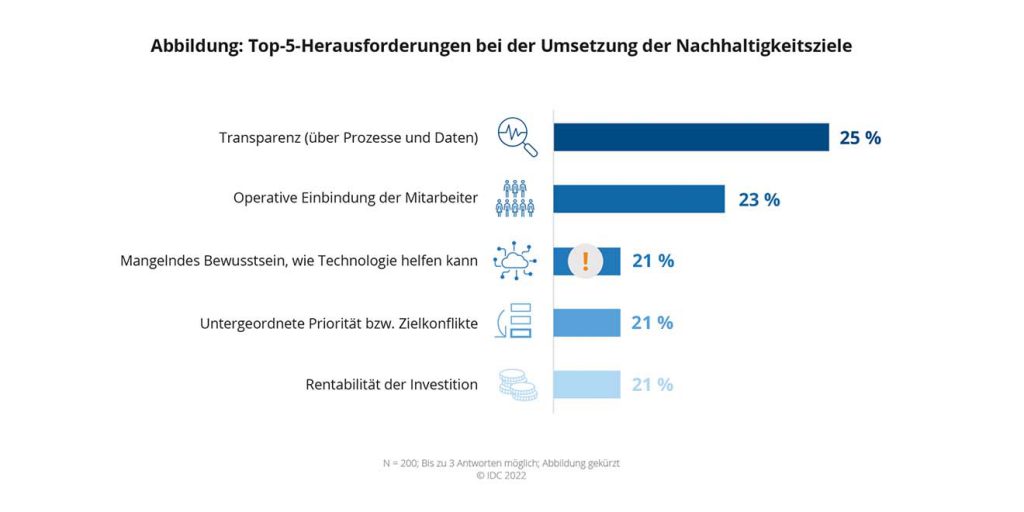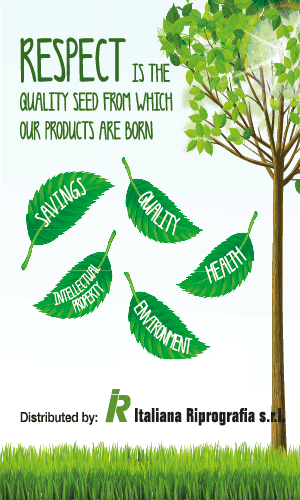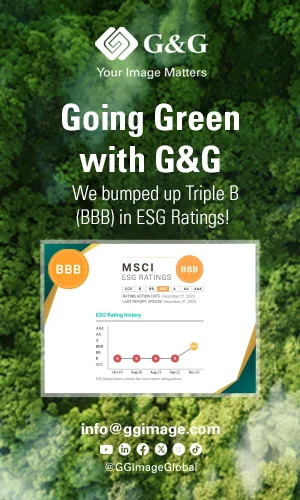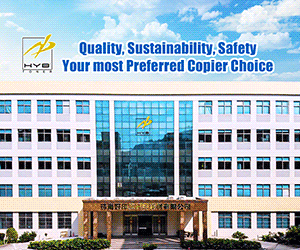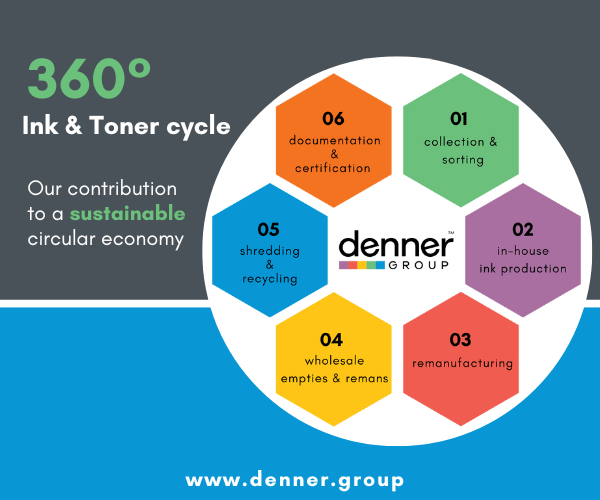IDC publishes new study assessing IT and sustainability
February 25, 2022
The new IDC study shows a lack of transparency about processes and data is slowing down sustainability initiatives in German companies.
Never before has the impact of consumption and the economy on the environment and society received more attention than it does now. In recent years, awareness of social issues with global consequences for the future has increased rapidly – recently also driven by the consequences of the COVID-19 pandemic. Companies in Germany not only encounter changing consumer behaviour, but also stricter regulations and investor requirements in terms of sustainability.
The new IDC study “IT & Sustainability in Germany 2022” has revealed to what extent sustainability has arrived in companies and IT departments and what challenges organisations face when implementing sustainability initiatives:
- Sluggish digitisation takes revenge: A lack of transparency about processes and data slows down sustainability initiatives
- The focus of IT initiatives is shifting towards supply chains and future technologies such as IoT, Big Data & Analytics, RPA and Green Coding for more sustainable business processes
- Current data collection and KPIs focus on internal processes: for ambitious sustainability initiatives, however, many are planning to expand their entire value-added system
In December 2021, IDC surveyed 200 companies with more than 100 employees across industries in Germany in order to gain detailed insights into the plans, challenges and drivers in relation to sustainability initiatives through and with IT.
The pandemic has given a significant boost to the importance of sustainability for 80% of the companies surveyed in Germany. According to their own statements, 38% of the companies surveyed already have a company-wide sustainability approach, and another 40% have individual programmes.
The biggest drivers are customer demand for environmentally friendly products and services, as well as improvements in operational and production efficiency. Almost all organisations stated that they want to achieve their sustainability goals by 2030. In addition to a consistent focus on the principles of the circular economy (44%), this includes working with suppliers and partners who share their sustainability goals (41%).
The biggest challenges in implementing the current sustainability goals include a lack of transparency about processes and data (25%), the involvement of employees at the operational level (23%) and a lack of awareness of how technology can help to increase sustainability (21%). “On the one hand, it is surprising that one in five companies in Germany does not seem to have a clear idea of ??how IT can be used in terms of sustainability,” said Elena Georg, Project Manager at IDC. “But it also fits into the picture if we look at where German companies are in terms of digitisation”.
While energy management or employee training for more environmental awareness are implemented today, the procurement of fair IT products, the construction of smart buildings and the ecological assessment of products and services will be among the initiatives in the future. In the future, every second respondent wants to optimise the efficiency of supply chains, manufacturing processes, machines or the vehicle fleet – all measures that are only possible with IT.
Initiatives that have already been implemented primarily include the procurement of resource-saving hardware, the regular modernisation of the IT infrastructure and application environment, and the extension of the life cycles of IT devices. In the future, more than every second company is planning sustainable software development and architecture, the so-called Green Coding.
Sustainability per se has a high priority in the IT departments and is already taken into account at least selectively in strategic IT decisions in two out of three companies. In around 28% of the companies, however, the sustainability aspect is already an integral part of a holistic IT strategy, and the trend is clearly rising. After all, for half of those surveyed, sustainability is an important influencing factor when purchasing IT. In addition, almost a third of companies want to invest more than 30% of their IT budget in sustainable products and services in the next 24 months, and half of the companies plan to spend between 10 and 29% of the budget sustainably.
The immense sustainability potential in IT already becomes clear when looking at the useful life of IT hardware, because the end of the useful life is, unsurprisingly, still defined in companies primarily by depreciation and the contract period and not tied to performance or wear and tear. When the hardware has reached the end of its useful life, it is primarily recycled (29%), resold (27%) or returned to the device manufacturer (24%). In the hardware area in particular, the printer infrastructure plays an important role in connection with the sustainability strategy for almost 90% of the companies surveyed.
In particular, the cloud and mobile applications generally have a high level of maturity and are used by 37 and 35% of the companies surveyed for sustainable projects. The greatest sustainability advantages of the cloud as an operating model are seen in the reduction of energy costs (40%) and the improvement of the CO2 footprint (39%). More than 60% of companies believe that large cloud data centre providers are able to run their data centres more sustainably than their own company could. They see the strengths above all in the use of the most energy-efficient technology, renewable energy sources and higher server utilisation.
According to those surveyed, the technologies planned for the future for more sustainability include IoT, analytics/big data and RPA. Exciting: in the coming years, companies assume that there will be a high demand for new software to accompany and support sustainability initiatives – especially for CO2 accounting/carbon tracking (45%).
“It is obvious that the implementation of sustainability measures requires new solutions and innovations that companies often cannot create on their own,” said Marco Becker, Project Manager at IDC. “Therefore, external partners, sustainable ecosystems and, in the future, above all the focus on their supply chains are important for almost two thirds of those surveyed to achieve their sustainability goals. We expect that in the future there will be more investment in sustainable ecosystems and that companies will increasingly turn to IT providers who have the appropriate networks.”
Sustainability-related KPIs are the central means of being able to evaluate and control measures and communicate them efficiently. While KPIs such as energy consumption or production efficiency are the standard today, newer KPIs such as water footprint (45%) or supply chain miles (43%) will be used in the future. The collection of data relevant to sustainability is currently focused on internal processes; in the future, companies want to promote data exchange with their suppliers and partners.
IDC believes that the study clearly shows that the topic of sustainability already has a major impact on German companies and will continue to increase as a result of increasing demands from customers, politicians and investors. IT clearly has a key role to play in achieving greater sustainability, as it can use data processing and analytics to both effectively support sustainability initiatives and be the basis for new innovative processes and products with a positive impact on sustainability. IT not only supports the implementation of sustainability measures – they are often made possible in the first place through the use of IT. By providing cloud, IoT or AI, IT creates the necessary transparency in the company itself and along the supply chain.
IDC sees great potential above all in the provision of sustainable IT: more sustainable hardware that is resource-efficient and has a longer lifecycle, regular modernization of the IT infrastructure and application environment, or sustainable software development and architecture. All of this can make IT in companies and thus the entire organization more sustainable per se.
However, your own organisation is only the first step. In today’s strongly networked value-added systems, many sustainability initiatives can only be really successful if companies become active beyond their own company boundaries. A comprehensive and efficient exchange of data with partners in the supply chains and business ecosystems is an essential prerequisite for this, which IDC believes is all the more successful the more participants in the ecosystem motivate and support each other.
Above all, IDC sees the providers as having a duty to transform their own business in a sustainable manner, to revise and expand their product portfolio from this point of view and, above all, to advise and support customers with their sustainability measures.
Categories : World Focus
Tags : IDC IT Market Research Study Sustainability




